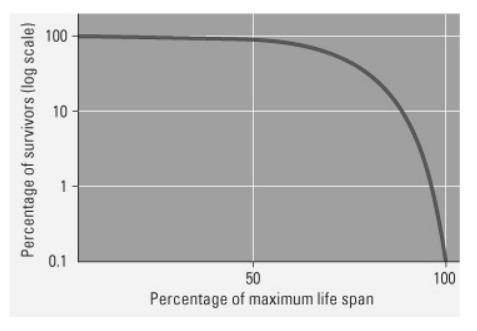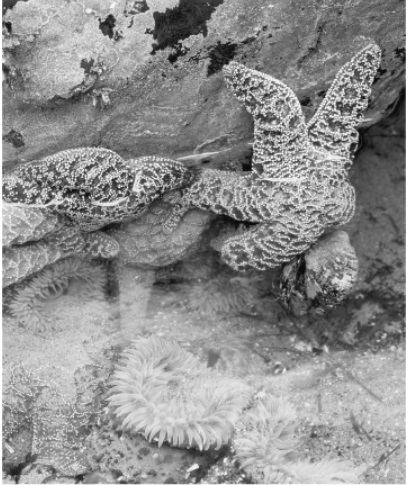Navigation » List of Schools, Subjects, and Courses » Bio 1010 – General Biology » Exams » Unit 1 Exam » Unit 1 Exam Sample Answers

Unit 1 Exam
1. The scientific method is used to
specific questions about the natural world.
determine absolute truth.
distinguish good from evil.
establish moral codes.
to search for truth.
2. Which of the following statements is a testable scientific hypothesis?
Antioxidants from food are better than antioxidants from a vitamin pill.
Eating fish reduces the chance of having a stroke.
Embryonic stem cell research will allow scientists to find a cure for diabetes.
Smoking makes people less attractive.
3. Which of the following hypotheses is testable using scientific methods?
Bees can see ultraviolet light that humans can’t.
The dinosaur Tyrannosaurus rex was a scavenger, not a predator.
Peacocks like to display their large tail feathers.
People with type O blood are natural meat eaters.
People with type B blood like to donate blood.
4. In an effort to increase milk production of dairy cows, a farmer decides to experiment with a new food additive. Half of the cows (Group 1) are given the new food additive, while half of the cows (Group 2) are not given the food additive. Group 1 represents the ________ group of this experiment, while Group 2 represents the ____ group of the experiment.
experimental, control
prediction, hypothesis
control, prediction
control, experimental
placebo, control
5. Ideally, an experiment studying the effect of a cold medicine should have
no control group.
control and experimental groups .
a small sample size.
subjects of only one gender.
subjects that don’t have colds.
6. What level of ecology is concerned with groups of individuals of different species?
community
tissue
organism
ecosystem
population
7. Which of the following choices matches this figure?

Dolphins produce only single offspring at a time and provide parental care for many months.
Crab spiders produce hundreds of tiny offspring, most of which do not survive.
During “mating frenzies” male and female squid aggregate and release hundreds of eggs and sperm into the water column. The fertilized eggs are often quickly preyed on by fish.
The century plant grows for many years and reproduces and releases hundreds of seeds just once before it withers and dies. Because of the dry desert environment in which it lives, many of the seeds do not survive or are eaten.
8. What is a population?
a group of organisms isolated in space and time
a group of organisms isolated in space
a group of organisms of the same species isolated in space and time
a group of organisms of the same species isolated in space
all of the organisms of a species existing at a particular time
9. Over time, the populations of most species ______.
are relatively stable
continuously decline
increase rapidly, crash, and never recover
continuously increase
exhibit boom-and-bust cycles
10. Please read the following scenario to answer the following question(s).
Michigan’s Isle Royale is located in Lake Superior and is 45 miles long and 9 miles wide. Ecologists estimate that the moose population has been on the island since around 1900. The wolf population, on the other hand, has only been there since the winter of 1949. The conditions had to be just right for the lake to freeze and the weather to be calm enough for the first wolves to make the passage over to the island. When the wolves arrived, they were greeted with a large moose population that had no predators. The moose population was at a dangerously high level, but was kept in check by the arrival of the wolves. This “harmonious” pattern continued for at least 20 years.
In 1982, the wolf population suddenly crashed. The problem was a new canine virus. This virus surfaced around the world in 1978 and spread rapidly in about six months. Infected animals can survive, but they have to be treated immediately. Ecologists hypothesized that the virus arrived on the island carried on the shoe of a human traveler. The wolf population decreased from 50 to 14 individuals in a year. While the wolf population dropped, the moose population increased. However, the winter of 1996 was extremely harsh and the moose population experienced a major crash. More than 500 animals died during the winter months, reducing the population to less than 800 animals.
The harsh winter that led to the death of many moose in 1996 is an example of a(n) ______.
density-dependent factor
acclimation
density-independent factor
population that has exceeded its carrying capacity
11. With regard to the environment as a whole, when is the worst time to apply pesticide to your lawn?
when it is raining, or is about to rain
when it is cold, or is about to get cold
at the same time you apply fertilizer
at night
during the day
12. Organisms at the first trophic level are ______.
detritivores
decomposers
parasites
predators
autotrophs
13. In the food chain grass antelope human lion, the human is a(n) ______.
tertiary consumer
secondary consumer
herbivore
primary consumer
producer
14. Biomass is the total amount of ______ an ecosystem.
organic matter tied up in the consumers of
solar energy in
organic matter tied up in the producers of
chemical elements recycled by the detritivores of
organic material in
15. Refer to the following figure. This photo represents ______ population(s) and ______ community(ies).

many, 1
1, 1
1, many
unable to determine from the photo
16. The increase in the concentration of a substance in the tissues of organisms as it is passed up a food chain is called ______.
concentration of toxins
biological magnification
maximization
incrementalization
predatory accumulation
17. The increase in global temperature that is the greenhouse effect is primarily due to ______.
CO 2 allowing more solar radiation to penetrate Earth’s surface
CFCs slowing the escape of heat from Earth
the loss of ozone that trapped cooling UV radiation in the atmosphere
CO 2 slowing the escape of heat from Earth
CO 2 slowing the escape of UV radiation from Earth
18. Which of the following sources of energy contribute(s) to global warming?
solar
coal
geothermal
nuclear
all of these
19. DDT was once used as a(n) ______.
fuel additive
aerosol propellant
refrigerant
insecticide
herbicide
20. Which one of the following is likely to result from an increase in global atmospheric temperature of as little as 2°C?
rising sea levels
coastal flooding
altered patterns of global rainfall
altered ecosystem boundaries
all of these
21 Organic farming is environmentally friendly because
it uses less water than traditional farming.
it avoids the use of synthetic pesticides and fertilizer.
it has greater net primary production than traditional farming.
it is more energy efficient, since it doesn’t produce meat products.
it uses more water than traditional farming.
22. Which of the following features would have the greatest influence in creating a more sustainable urban society?
Improving the efficiency of water filtration systems in order to decrease our consumption of freshwater.
Increasing fuel efficiency in our vehicles so we can decrease the consumption of fossil fuels.
Decreasing the amount of environmental pollution produced by industry.
Decreasing the amount of land that is altered in order to accommodate human desires (new homes, factories, agriculture, etc.).
Exploring alternative energy sources that are more environmentally favorable (i.e. solar, hydropower, etc.).
23. Building a sustainable society
can only be attained by scientists and economists.
needs to be carried out by national governments.
can include even small-scale efforts of individuals.
is the responsibility of corporations.
can only be attained by farmers.
24. Desertification is primarily caused by which of the following activities?
overgrazing of livestock
overplanting of crops
overuse of farm machinery
lack of rainfall
restoration of wetlands
25. Which of the following creates the least amount of soil erosion?
poor landscaping practices that expose the land to excess wind
overgrazing by livestock
use of drip irrigation systems
deforestation
wetland destruction
26. Energy cannot be recycled.
True
False
27. All communities consist of the same number of species.
True
False
28. Wind power is not a renewable soure of energy because wind directions change too often.
True
False
29 A population can increase in size indefinitely.
True
False
30. More sparse urban settlement patterns may help conserve energy and preserve the environment.
True
False
Unit 1 Exam Answers
3. Which of the following hypotheses is testable using scientific methods?
Bees can see ultraviolet light that humans can’t.
The dinosaur Tyrannosaurus rex was a scavenger, not a predator.
Peacocks like to display their large tail feathers.
People with type O blood are natural meat eaters.
People with type B blood like to donate blood.
Answer: Bees can see ultraviolet light that humans can’t.

